八年级英语同步辅导(上册)
八年级英语同步辅导(上册)

八年级英语(上册)深入教材,提优训练(复习学案)Unit 1.Where did you go on vacation ?一、重点单词(听写)二、重点短语。
(听写)1.相当多,不少2.去度假3.待在家4.照一些照片5.感觉像……;想要6.到达三、重点知识点拨:1、seem 的常用句型。
a.主语+seem(+to be ) +表语。
Tom seems (to be ) a very clever boy.b.It’s seems/ seemed+ that 从句。
It seems that no one knows what has happened in the parkc.主语+seem +动词不定式。
I seem to have caught a cold.2.quite a few 与quite a little二者都表示“相当多,不少”。
quite a few+可数名词quite a little+不可数名词a. There _____ ______ _____ _____ new books in the bookstore.(书店里有相当多的书)b. There _____ ______ _____ ______ water in the bottle.(瓶子里有很多水)3.How do you like…是口语中一个常用句式,意为“你觉得……怎么样?”相当于“What do you think of…”。
注意:How do you like…还可用于下列场合:a.在喝茶或咖啡时,询问对方:“你喜欢喝什么样的茶或咖啡?”。
---How would you like your coffee? ---_____________________.(2012无锡中考)A. Black, pleaseB. Very muchC. It tastes goodD. No, thanksb.用于饭店询问顾客对饭菜的做法。
八年级英语上Unit1同步辅导2-牛津版
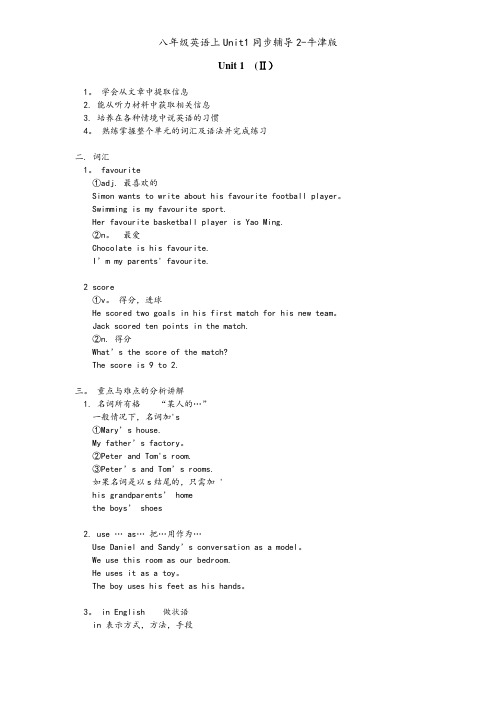
Unit 1 (Ⅱ)1。
学会从文章中提取信息2. 能从听力材料中获取相关信息3. 培养在各种情境中说英语的习惯4。
熟练掌握整个单元的词汇及语法并完成练习二. 词汇1。
favourite①adj. 最喜欢的Simon wants to write about his favourite football player。
Swimming is my favourite sport.Her favourite basketball player is Yao Ming.②n。
最爱Chocolate is his favourite.I’m my parents' favourite.2 score①v。
得分,进球He scored two goals in his first match for his new team。
Jack scored ten points in the match.②n. 得分What’s the score of the match?The score is 9 to 2.三。
重点与难点的分析讲解1. 名词所有格“某人的…”一般情况下,名词加's①Mary’s house.My father’s factory。
②Peter and Tom's room.③Peter’s and Tom’s rooms.如果名词是以s结尾的,只需加 'his grandparents’ homethe boys’ shoes2. use … as… 把…用作为…Use Daniel and Sandy’s conversation as a model。
We use this room as our bedroom.He uses it as a toy。
The boy uses his feet as his hands。
3。
in English 做状语in 表示方式,方法,手段What's this in English?Please say it in Chinese。
2023人教版八年级上册英语同步解析

2023人教版八年级上册英语同步解析一、导言人教版八年级上册英语是初中阶段学习的重要一环,是学生打好英语基础的关键阶段。
本教材旨在通过系统的英语学习,帮助学生掌握初中英语的基本知识和技能,提高学生的英语综合能力。
为了帮助学生更好地掌握课本知识,本文将对2023年人教版八年级上册英语课本进行同步解析,为学生提供更系统、全面的学习指导,帮助学生更好地掌握英语知识。
二、Unit 1 Where did you go on vacation?本单元主要介绍谈论去过的地方的句型,教学重点是过去式的构成及运用,教学难点是特殊疑问句的运用和回答。
学生在学习本单元时主要应注意以下几点:1. 学习动词过去式的构成及运用,例如go—went,play—played 等;2. 掌握询问过去经历的特殊疑问句构成及回答,例如Where did you go on vacation? I went to the beach.三、Unit 2 What’s the matter?本单元主要介绍询问健康状况的句型,教学重点是学会用What’s the matter? What should I do? 句型询问疾病并给出建议。
学生在学习本单元时主要应注意以下几点:1. 掌握询问健康状况的基本句型,例如What’s the matter? What should I do?2. 学习并掌握常见疾病的表达及相关建议,例如I have a toothache. You should see a dentist.四、Unit 3 Could you please clean your room?本单元主要介绍请求他人做事的礼貌方式,教学重点是能在日常交际中运用请求的礼貌形式。
学生在学习本单元时主要应注意以下几点: 1. 学习礼貌地请求他人做事的句型,例如Could you please clean your room?2. 掌握礼貌回应及表示同意的表达方式,例如Sure, I’d be happy to.五、Unit 4 Don’t eat in class.本单元主要介绍规则和禁令的表达方式,教学重点是口头表达和书面表达中能正确、流利地运用祈使句用以表示规则和禁令。
【同步辅导】八年级上 Unit 6 I’m more outgoing than my sister.
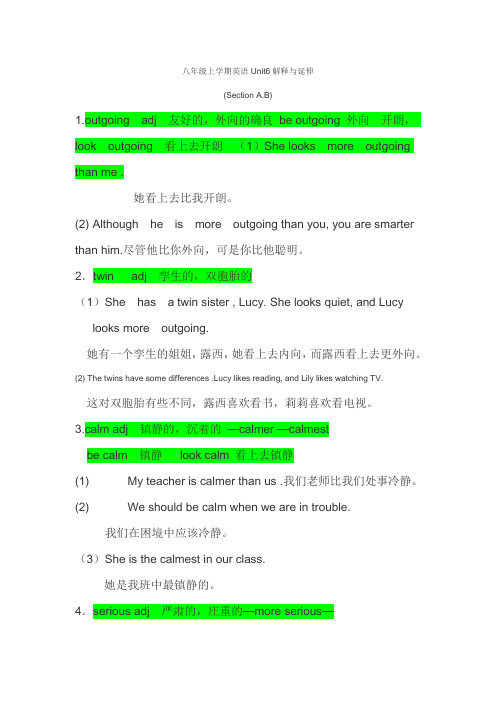
八年级上学期英语Unit6解释与延伸(Section A.B)1.outgoing adj 友好的,外向的确良be outgoing 外向开朗,look outgoing 看上去开朗(1)She looks more outgoing than me .她看上去比我开朗。
(2) Although he is more outgoing than you, you are smarter than him.尽管他比你外向,可是你比他聪明。
2.twin adj 孪生的,双胞胎的(1)She has a twin sister , Lucy. She looks quiet, and Lucy looks more outgoing.她有一个孪生的姐姐,露西,她看上去内向,而露西看上去更外向。
(2) The twins have some differences .Lucy likes reading, and Lily likes watching TV.这对双胞胎有些不同,露西喜欢看书,莉莉喜欢看电视。
3.calm adj 镇静的,沉着的—calmer —calmestbe calm 镇静look calm 看上去镇静(1) My teacher is calmer than us .我们老师比我们处事冷静。
(2) We should be calm when we are in trouble.我们在困境中应该冷静。
(3)She is the calmest in our class.她是我班中最镇静的。
4.serious adj 严肃的,庄重的—more serious—most serious , be serious 庄重,严肃,look serious看上去庄重,nothing serious 并不严重(1) The girl in the red skirt looks very serious.穿红色裙子的那个女孩看上去很严肃。
初二第一学期英语同步辅导
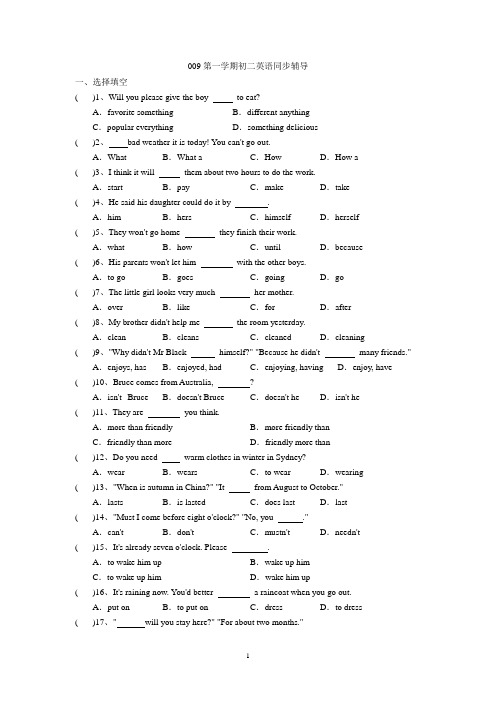
009第一学期初二英语同步辅导一、选择填空( )1、Will you please give the boy to eat?A.favorite something B.different anythingC.popular everything D.something delicious( )2、bad weather it is today! You can't go out.A.What B.What a C.How D.How a( )3、I think it will them about two hours to do the work.A.start B.pay C.make D.take( )4、He said his daughter could do it by .A.him B.hers C.himself D.herself( )5、They won't go home they finish their work.A.what B.how C.until D.because( )6、His parents won't let him with the other boys.A.to go B.goes C.going D.go( )7、The little girl looks very much her mother.A.over B.like C.for D.after( )8、My brother didn't help me the room yesterday.A.clean B.cleans C.cleaned D.cleaning( )9、"Why didn't Mr Black himself?" "Because he didn't many friends."A.enjoys, has B.enjoyed, had C.enjoying, having D.enjoy, have ( )10、Bruce comes from Australia, ?A.isn't Bruce B.doesn't Bruce C.doesn't he D.isn't he( )11、They are you think.A.more than friendly B.more friendly thanC.friendly than more D.friendly more than( )12、Do you need warm clothes in winter in Sydney?A.wear B.wears C.to wear D.wearing( )13、"When is autumn in China?" "It from August to October."A.lasts B.is lasted C.does last D.last( )14、"Must I come before eight o'clock?" "No, you ."A.can't B.don't C.mustn't D.needn't( )15、It's already seven o'clock. Please .A.to wake him up B.wake up himC.to wake up him D.wake him up( )16、It's raining now. You'd better a raincoat when you go out.A.put on B.to put on C.dress D.to dress( )17、" will you stay here?" "For about two months."A.How many B.How much C.How often D.How long( )18、The teacher told us for the meeting.A.not be late B.don't be late C.not to be late D.not late( )19、Will you please me the book when you come to school?A.take B.bring C.carry D.borrow( )20、Class was over. All the students stopped and went out.A.write B.to write C.writing D.wrote( )21、---Ought we to elect a secretary now?----No, you .A. shouldB. ought not toB.C. ought to notD.not ought to( )22、----What are you doing for vacation?----I . time with my family.A. spendB. spendsC. am spendingD.spent( )23、What do you think English class?A. atB. ofC. onD. for( )24、She usually goes to school by bus, but these days she tries a bike.A..to rideB.ridingC.to ridingD.rode( )25、We should be polite to .A.the other B.other C.others D.the others二、根据要求变换句型。
新人教英语八上单元复习、周末辅导讲义(八上Unit 6)

新人教八年级英语上册周末同步辅导资料(Unit 6)单元语法小专题一般将来时的用法(Ⅰ)1.一般将来时的定义一般将来时表示在将来某个时间要发生的动作或存在的状态,也可以表示经常或反复发生的动作。
一般将来时主要有两种表现形式:“will+动词原形”和be going to结构。
本单元主要介绍be going to结构。
2.be going to结构的基本句式(1)肯定句:主语+be going to+动词原形+其他.如:I am going to play computer games next Sunday.下周日我打算玩电脑游戏。
(2)否定句:主语+be not going to+动词原形+其他.如:He isn't going to see a film with us tonight.今晚他不打算和我们一起去看电影。
(3)一般疑问句:Be+主语+going to+动词原形+其他?肯定回答:Yes,主语+be.否定回答:No,主语+be+not.如:—Are you going to watch talk shows after dinner?晚饭后你们打算看访谈节目吗?—Yes,we are./No,we aren't.是的,我们打算看。
/不,我们不打算看。
(4)特殊疑问句:特殊疑问词+be+主语+going to+动词原形+其他?如:How are you going to learn English?你打算怎样学习英语?3.含be going to 的there be 句型含be going to的there be句型的句子结构为“There is/are going to be+主语+其他.”。
主语是可数名词单数或不可数名词时be动词用is,主语是可数名词复数时be动词用are。
如:There is going to be a meeting tonight.今天晚上将有一场会议。
英语八年级上册教材同步详细讲解

英语八年级上册教材同步详细讲解Ability is not the only criterion, but character is the criterion.仁爱英语八年级上册U n i t1t o p i c1Section A语言点讲解1.I saw you play basketball almost every day during the Summerholidays.常见的感官动词有:see; watch; hear; smell; feel 等..后可接①动词ing形式;表此动作正在发生..②动词原形;不表此动作正在发生;表此动作已完成或存在的事实..① Do you smell something burn 答案:burning② I often see him basketball after class. play答案:play2.There is going to be a basketball game between Class Threeand our class this Sunday.There be 句型:表某地有某物. 而have 表示某人有…1There is/ are..表现在某地有某物;is/are取决于后面的名词是单数还是复数;单数用is复数用are;如①There is a pen and two rulerson the desk.②There are two rulers and a pen…2 There was/were…表过去某地有某物..was/were的用法也遵循就近原则..3There will be 或 There is/are going to be 表某地将有某事物..不能说成 There will have…题 a match in our school between Class Three and Class Four next week.3.Would you like to come and cheer us on ----- Sure; I’dlove to.1Would you like + 不定式表建议或邀请..常用I’d love to 来回答;不同意也常用“I’d love to; but…”来拒绝别人..如:Would you like toplay basketball with me --- I’d love to; but I have a lot of homework to do.2在肯定句中 would like= want 如:I’d like to have a rest.= I want to have a rest.4.I hope our team will win.---- Me ; too.= So do I.① hope + that从句;that 可省去..I hope that I can see you soon.② hope to do sth. I hope to see you soon.注意: 1wish愿与hope的用法一样;后既可以接从句也可以接不定式;但不能说hope sb. to do sth. hope 后不接双宾语; 但 wish 可以;如:I hope you to help me 错 I hope that you can help me.对2hope 后接的从句常用将来时态表可以实现的愿望;而wish 后接的宾语从句常用过去时态表难以实现的愿望;如:①I hope you will come. ②I wish I could fly to the moon.5. I prefer rowing.1prefer过去式\过去分词需双写 preferred 后可直接接动词ing形式或动词不定式; 表更喜欢…; 用法同like/ love:①I prefer swimming 更喜欢经常游泳②I prefer to swim.更喜欢这一次去游泳2prefer doing A to doing B 相当于:like… better than…I prefer swimming to skating. ==I like swimming better than skating.3 后接不定式时与rather than 或instead of连用;如:Hepreferred to die rather than to steal. / He preferred todie instead of stealing. 他宁死也不去偷窃..6. -----Do you row much 你经常划船吗 ----- Yes ; quite a bit /a lot. 是的;经常..quite a bit/ a lot 经常/许多;大量. ①quite a bit of 后接不可数名词;如:quite a bit of money.. ②quite a lot of 后既可接可数名词复数也可以接不可数名词;如:quite a lot of books/ information..而③quite a few=many 表“相当多”后接可数名词复数;如:quite a few students④quite a little =much表许多;后接不可数名词;如; quite a little money ⑤very few / little 很少很少..7.Are you going to join the school rowing club①join 加入人群;组织②take part in 参加活动;比赛注意:1join可与in连用;后接活动;即 take part in=join in = be in后都接活动..如:①He joined in the game ;②He joined inhelping the old man. ③I’ll be in the relay race. 2 Join sb.in doing sth. 表加入某人的活动.. 如:Will you join us inplaying basketballSection B1.How tall is he; do you know ----- Yes. He is2.26 meterstall.与how构成的疑问词有:How tall身高多高; how high山多高;how heavy多重;how long 多长;How wide 多宽;how deep 多深;how old 多大…. 对应的回答常用“数词+量词+形容词”;如:1.70meters tall; 2 kilometers high; 3 kilos heavy; 20 years old 2.They both play for the Houston Rockets in the NBA.play for 为某个队效力;play against 与某个队比赛;play with 玩某物/与某人玩比较:play basketball 打篮球;Look; the baby is playing with a basketball 玩弄一个篮球3. what are you going to be when you grow up = what do youwant to be …你长大想干什么5.David Beckham; a famous soccer star; arrived in Beijing withhis team yesterday.表到达的有:①arrive at + 小地名;arrive in +大地名② get to③ reach6.The fans are very excited.1excited 表“感到激动的、兴奋的”;常只作表语;主语常为人..如:We are excited.类似的有:interested有趣的; tired感到疲劳的; bored感到厌烦的2exciting 表“令人激动兴奋的”既可作定语;也可作表语;作表语时;主语常为事物;如:①an interesting book; ②The bookis interesting.类似的有:interesting令人有趣的; tiring令人感到疲劳的;boring令人感到厌烦的7.It’s too bad that they aren’t going to stay in Beijing forlong.主语是斜体that从句部分;前用it 来代替它..因此这是一个含主语从句的复合句..It’s too bad that…= It’s a pity that…= It’s a shamethat..很遗憾…..8.在英语中有一些表示位置移动的词;如:go;come;leave; arrive;fly 可用现在进行时态表将来..如:They are flying to Wuhantomorrow. 表将飞往武汉而不是正去武汉 They are leaving for Japan.= They will leave for Japan.9.Zhang Yining; one of the world’s best women table tennisplayers; won two gold medals for China.1one of 表…中的一个;后接可数名词的复数;如:one of myfriends2名词作定语修饰名词时;一般用单数形式;如:two book shops; two shoe shops; 但man;woman;sports修饰可数名词复数时;常用复数形式;如:two men teachers; sports meet3win a gold medal赢得一枚金牌; win a prize 赢得奖品; win the first place 赢得第一名10. What a shame = What a pity 多么遗憾类似的有:What fun 多么有趣11. break the record 打破纪录;keep the record 保持纪录12. Please write back soon.write back 回信Section C1.once a week; 一周一次twice a week一周两次; 三次或三次以上用“数字+times”如:three times a year; four times a day; five times a week;…..2.go + v-ing形式的短语表“去做某事”如:go hiking 去徒步旅行;go shopping去购物; go skating 去滑冰;go skiing 去滑雪;go fishing 去钓鱼..3.she spends half an hour doing exercise in the gym every day.当exercise指“体操、练习”时;是可数名词;如:do morningexercises 做早操;do English exercises 做英语练习题;但exercise指“锻炼;运动”时;是不可数名词..如:do exercise 做运动..exercise 还可作动词;指“锻炼;运动”如:She exercisesevery morning.4.She plays it pretty well.pretty well= very well相当好5.She is also good at jumping.be good at…= do well in…擅长…如:I am good at English.= I do well in English.be good for… 对…有好处;Running is good for your health.反义词为:be bad at= do badly in 不擅长…. be bad for 对…有害类似短语:be good/bad to sb. 对某人好/不好6.They are sure that she will win.①be sure +that从句;表“确信…”如:I’m sure that eatingtoo much is bad for you.②be sure to do sth..确信做某事We are sure to win next time.③be sure of/about doingsth. 表确信做某事 I’m sure of that.7.How often does she go cycling(1)go +动词ing形式;表进行某种户外活动;如:go swimming; gofishing; go climbing.(2)How often问多久一次;频率..常用sometimes; seldom; twice ayear等回答..How long 问多久..常用“For一段时间”来回答How soon 问多快时间;用于将来时态..常用“In an hour 在一小时内等”来回答..如:How soon will you come back -----Ina week.与how搭配的疑问词有:①How many 多少接可数名词复数形式②How much 多少接不可数名词③How old 问年龄④How tall 多高人、树⑤How high 多高山、楼⑥How far 问距离⑦ How long 还可以问物体的长度1 is it from your home to your school ------It’s two kilometers away.2 is the room ------ It’s two meters wide.3 is the tree -------It’s three meters high.8. Because it makes me strong and it is popular all over the world.因为它使我强壮并且它流行make; let ; have 当表“使;让”时是使令动词;后接动词原形..如:make me crymake 后还可以接形容词;名词;如: make me strong; make him our monitor ;10.keep healthy = keep fit 保持健康healthy=fit都是形容词;health 是名词Section D1.Have a good day 祝你今天玩得高兴 Have a good journey 旅途愉快 Have a good time 祝你过得愉快 Have a good weekend 周末愉快八年级上册Unit 1 topic 2Section A1.Michael; could you please do me a favor(1)Could you please = Would you please…意为“请你…好吗”后接动词原形(2)do sb. a favor= help sb.= give sb. a hand 帮某人的忙.. 2.But one of my teammates fell ill..但是我们队友中的一员病了..1One of +可数名词复数;表“….. 中之一”当它作主语时;是单数第三人称..如:One of my friends likes playing computer games 类似的短语有:Some of …;中的一些 most of…中的大多数;2 fall ill 生病强调动作be ill 病了强调状态如:He fell ill yesterday; and now he is ill in bed.3.----Would you mind teaching me ----- Not at all. 你介意教教我吗 ---- 不介意..(1)Would you mind notdoing sth. 你介意别做某事吗礼貌地请求某人做或别做某事回答去做的有:Not at all 或 Of course not或 Certainly not 回答不去做的有:Sorry;I won’t ./Yes;please don’t./ You’d better not.(2)Would you mind my/me smoking here 常用物主代词 my; her;his; our 等;少用代词宾格me; he; us 等4.Let’s go and practice. 让我们去练习practice+名词/动词ing;表练习什么/做什么;如:①We oftenpractice spoken English.英语口语②Let’s practice dancing.5. Sorry; I’ll put it somewhere else.somewhere else 别的某个地方 somewhere 是不定副词;else 是形容词..形容词修饰不定副词、不定代词时;常放在其后.. 如:something sweet甜食;Anything else 还有别的吗 Nothingserious 不严重6. Don’t be late next time. --- Sorry; I won’t.对不起;我将再也不会了①be late 迟到;如:You are late again. ②be late for…做…迟到如:He was late for school.3 回答否定祈使句常用:Sorry;I won’t. 如:Don’t shout at me ---- Sorry; I won’t.回答肯定祈使句常用:OK;I will. 如:Please study hard. ---- OK; I will.7.Would you please say it in English. 你能用英语说一下它吗①Would you please not do sth 请求某人做某事②Would you like to do sth. 提建议③Would you mind not doing sth 请求8.That’s very kind of you; but I can manage it myself.太感谢你了;但我会自己处理的..manage 作“管理;处理”时;结构为:manage sb./sth. 如:She managed the hotel well.manage 作“设法做成某事”时;结构为:manage to do sth. 如:it’s too noisy here; I’ll manage to leave here. 注意比较try to do sth. 努力去做某事"It is+形容词+of sb.to do sth.."和"It is+形容词+for sb.to do sth.."这两个句型容易混淆..什么情况下用of 或for 是一个考点..实际上前者的形容词用来描述某人的;因此可以转换成: Sb.+be +形容词+to do sth. 后者的形容词用来描述做某事的;可以转换成:To do sth.is+形容词..如:It is right of you to do more reading.= You are right to do more reading. right 用来描述youIt is easy for you to finish the work. = To finish the work is easy for you.Section B1.You are always so carelessalways 除了用于一般现在时态中;也可用于进行时态中;be always doing sth. 总是…. 常用来赞扬某人;如:She is always helping others.2.You missed a good chance.错过一个好机会miss意为”思念;错过”如:①I miss my mother very much. ②She missed the early bus.3.He did his best .他尽力了..a)do one’s best=try one’s best 尽某人最大努力②Do one’sbest to do sth.=try one’s bestto do sth. 某人尽力去干某事 We will do/try our best to study English well.4.Kangkang; would you mind saying sorry to Michael 你介意向Michael 道歉吗①Say sorry to sb 向某人道歉②say hello to sb. 向某人打招呼/问候..③say goodbye to sb. 向某人道别..5.I am sorry for what I said. 我为我所说的道歉..for 后面的what I said我所说的是一个宾语从句..类似的还有:what I saw 我所见的;what I thought about我所考虑的a)Be sorry for 表为…. 道歉;后面接名词、代词、从句或动名词..②Be sorry to do sth.抱歉去做某事.. 有时①②可互换如:I’m sorry for troubling you.= I’m sorry to trouble you.6.Keep trying We are sure to win next time.1Keep doing sth. 坚持做某事;keep sb. doing sth. 让某人一直干某事;keep on doing sth. = go on doing sth. 继续做某事2 ①be sure to do sth. 确信要做某事表将来如:It’s sure torain. 肯定要下雨..②be sure +that从句; 如: We are sure that we will winnext time.③be sure about sth. 对某事确信;如:I’m sure about theanswer.7. Kangkang was angry with Micheal.be angry with sb. 生某人的气be angry at sth. 因某事而生气; 如:He was angry at what he had said.8. With the help of Maria and Jane; Kangkang said sorry to Micheal.With the help of sb. = with one’s help 在某人的帮助下 With Maria and Jane’s help;….9. 1 turn on 打开电器、龙头等; turn off 关; 2 turn up 调大音量turn down 调小音量10. please take a seat. 请坐Take one’s seat = have one’s seat 坐某人的座位如:He took his seat and read a book.11.be busy with sth. 为某事而忙碌..如:Kangkang is busy withhis exam.be busy doing sth. 忙于做某事如:He is busy preparing for Christamas.12. Never mind.= It doesn’t matter.= That’s OK/all right.=Not at all. 没关系..都可以用来回答“I’m sorry.”如:I’m sorry I didn’t call you last night. --- Never mind. I guess you were busy.Section C1.Exciting Yes; but very tiring as well. 很精彩是的;但也很累..表“也”的有下列词;用法如下:①as well / too 用于肯定句末. I’m a student. He is astudent as well/too.②also 用于肯定句中位于系动词、情态动词之后;行为动词之前如:He is also a student. He also likes English.③either 用于否定句末..I’m not a student; he isn’t astudent either.2.He invented an indoor game for his students so that theycould play even in bad weather.1 so that ①为了;以便 He got up early so that he could catchthe early bus.②结果;以致 He left his book at home so that he wentback home again.so+形容词/副词+that从句:如此….以致…She is so beautiful that everyone likes him.such+名词短语+that 从句:如此….以致… She is such abeautiful girl thateveryone likes him.2① invent 动词发明②inventor 名词发明家③invention 名词发明 Inventors have invented many great inventions 发明家已经发明了许多伟大的发明..3.Do you know how to score in the game 在比赛中得分score 进球;得分①名词:The final score is 2-1. 最后得分为2比1..②动词: No one scored in the first half.没人得分在上半场..Section D1.I am a 15-year-old boy. 我是一个15岁大的男孩..用连接号“—”构成的词常做一个形容词;放在名词前作定语;此结构中数词后的词不用复数;不能说成 15-year s-old; 但不是一个词时;year 要用复数..如:He is 15 years old.2.①instead of代替...;是一个副词短语;不能放主语后独立作谓语动词;只能放在动词后作谓语;它后可接名词/代词/动名词v-ing..如:You should play out instead of working indoors.a)instead 代替…放句尾或句首..I don’t like swimming;let’s go hiking instead.3. I have great fun running.fun 是不可数名词;意为“乐趣”;词组have fun doing sth. 在做某事中得到乐趣; 如:We have great fun learning English. 注意:have fun= enjoy oneself= ha a good time.4.Before 和 after 既可作介词;后接动词ing形式..也可作连词;后接时间状语从句..如:开始跳高前;我们必须弄清楚如何跳得高..①Before starting jumping; we must get to know how to jump high. 介词② Before we start jumping; we must get to know how to jump high. 连词5. 短语:①shout at sb 朝某人吼不礼貌地;shout to sb. 朝某人大声地喊②be import to sb./ sth. 对某人是重要的..如:English is important to us.③build sb/oneself up增强某人体质如:Running can build ourselves up.④立刻;马上:in a minute= right now= right away= at once =soon八年级上册Unit 1 topic 3Section A1.I’ll be in the long jump and the high jump.be in + 活动;表“参加某活动; 相当于take part in 和 join in2.maybe 和may be①maybe =perhaps副词;表“可能;也许;大概”;在句中作状语;通常放句首;也可以放动词之前..如:Maybe you are right.可能你是对的②may be 表“可能是”常放句中;如:You may be right.你可能是对的3.动词放句首的几种情况:①动词原形放句首;用于祈使句..如:Read the dialogue loudly ;please.②动词ing形式动名词放句首作主语;把它当作单数第三人称对待..如:Reading in the sun is bad for your eyes.③动词不定式也可以放句首作主语;如: To talk with him is agreat pleasure. 当然;通常我们把不定式放句后;前用形式主语it 来代替它..因此这句话常说成:It is a great pleasure totalk with him.跟他交谈是一种莫大的乐趣4.My foreign friend; Steve; will come to cheer me on.cheer sb on 为某人加油..5.I am sure I will make friends during the sports meet.1 make friends 交朋友2 make friends with sb. 和某人交朋友;如:I wan to make friends with you. 3 sports meet 运动会6. I will do my best. I won’t lose.lose ①输反义词为:winI am afraid I will lose the game. ②丢失 I lost my book.7. It’s my first time to take part in the high jump.It’s one’s first time to do sth. 是某人第一次做…如:It’s her first time to cook dinner/Section B1.Let’s go to plant trees then. 那么让我们去植树吧..plant 和 grow 都表“种植”;一般可互换;但grow 比 plant 更需要精心的培育..常说:plant trees; grow rice.2.Let’s make it half past six. 我们约定6:30吧..这是约定时间的常用表达法.3.enough 的用法:1enough足够的/地修饰形容词或副词必须放在它的后面..如:big enough 大的足够 slowly enough 慢地足够 enough 修饰名词时;即可放其前;也可放其后..如:enough money 或 money enough.2 enough to do sth. 足够…..可以做…. 此句式还可以与so…..that…. ;too…to….互换..She isn’t old enough to go to school.== She is so young that she can’t go to school.=She is tooyoung to go to school.她太小了而不能上学..4.take photos= take pictures 照相Section C1. We’re sorry that we did badly in the high jump; but we’re sure we can do better next time.do badly in = be bad in 在…方面做得差 badly是副词;修饰动词do; bad 是形容词do better in = be better in 做得更好; 更擅长于…. better是well;good的比较级2. The People’s Republic of China took part in the Olympics for the first time in 1952.for the first time第一次如:I went to Beijing for the first time last summer holiday.3. The Olympic Games take place every four years.短语:1 take place 发生;举办 2 every four years 每4年一次Section D1. The Olympic rings are a symbol of the Olympic Games.a symbol of …的一种象征 Yellow was a symbol of imperial power in ancient China.2. There are five rings; and they stand for the five parts of the world.stand for 代表… The dragon stands for the Chinese nation. 3. You can easily find at least one of these colors in the flag of every country.at least 至少 = over = more than 如:There are at least 400 students in our school.4. improve our environment 改善我们的环境1 improve 改善;提高 I don’t know how to improve my English.2 improve oneself自我提高 we should study hard to improve ourselves八年级上册Unit 2 topic 1Section A1. What’s wrong with you 你怎么了同义句有:What’s the matter/ trouble with you matter/ trouble 是名词;前用the ; wrong 是形容词;前不用the2. 短语:have a cold=catch a cold患感冒;have a cough 患咳嗽;have a fever 发烧;have a stomachache 胃疼;have a headache 头痛 have a sore throat 喉咙疼注意这两个特殊点的I have a headache. = I have an ache in my head. ache 指持续的疼痛;pain 指肉体上的剧烈疼痛;sore常指发炎而引起的肌肉痛3. take a rest = have a rest 休息一下4. lift① 举起lift the box ②消散 The clouds will lift soon③电梯 get out of the lift5. You look pale.系动词有:be是;look看起来; smell闻起来; sound听起来; taste 尝起来; feel觉得;turn/get/become 变;他们后常接形容词作表语; 系动词常可用动词be 来退换..如:The music sounds wonderful. = The music is wonderful.6. I will take some medicine first and see how it goes.1 take some medicine = have some medicine 服药2 see how it goes 看它如何发展 go表事情的进展; 如:Everything is going well..7. I cough day and night.day and night 日日夜夜8.I don’t feel like eating.feel like doing sth.= want to do sth. 想要做…如: I feel like running.9.You’d better drink hot tea with honey.with 加…的; without 没有…如:Chinese tea with nothing= Chinese tea without anything10. You should lie down and rest.lie down 躺下; lie的现在分词为lying; 过去式为 lay11. You’d better not eat too much candy.1 too much 修饰不可数名词;还可以用来修饰动词;如:①too much money; ② Stay in bed and don’t move your legtoo much.2 too many 修饰可数名词复数;如:too many students3 much too修饰形容词或副词;如:much too expensive12. You should brush your teeth twice a day.brush one’s teeth 刷牙 tooth的复数teethSection C1. Let me check it over .check over = look over 检查正误;检查身体如:①Can you check over my homework.②The doctor checked her over and she was fine.2. Here; take these pills. 给;服下这些药片..pill 药片;服药用动词take/ have.3. I’m sorry to tell you that I had an accident yesterday.have an accident 发生一场事故4. The doctor told me to stay in bed for a week and look after myself.stay in bed 待在床上 in bed 常指生病在床上; on the bed 常指物品在床上5. So I’d like ask for a week’s leave.1 ask for a leave 请假2 ask for a week’s leave 请一周的假3 ask three days’ leave6. I hope I’ll get well and return to school soon.1 return to +某地= go/ come back to…表返回某地;如:Kangkang returned to Beijing.2 return sth. to sb. = give back sth. to sb.表归还某物给某人;如:You must return it to me soon. = You must give it back to me soon.Section D1. I couldn’t read it until today.否定句+ until...表不能做某事;直到什么时候才能做.. 如:I can’t help you until you tell me the truth. 我不能帮助你;直到你告诉我真相我才帮你..2. My sister is also sick.Sick和ill 都表“病的“;但sick 即可以作定语也可以作表语;如:①a sick girl; ②The girl is sick. 而ill只能作表语;如:Thegirl is ill. 因此sick>ill.3. Don’t worry about us.worry about sth./ sb. 为…担心4. You should drink plenty of boiled water.plenty of = a lot of 许多的;大量的; 可接可数名词的复数或不可数名词5. How are you feeling today 你今天感觉如何 ---Much better. 好多了..6. But my left leg still hurts when I move it. 但是我的左腿仍然痛;当我动的时候..hurt①疼痛:My leg hurts ②伤害 He hurt his leg when he fell.八年级上册Unit 2 topic 2Section A1. What’s up = What’s happening = What’s wrong = What’s the matter/trouble 怎么了2. Staying up late is bad for your health.1 stay up = sit up熬夜; 如:we stayed up until midnight tosee the New Year coming.2 动词ing形式动名词可直接放句首作主语;谓语动词用单三形式..3. too little 太少; too much 太多;都用来修饰不可数名词..4. going to school without breakfast 不吃早饭去上学..Section B1. You must not read in the sun.in the sun 在阳光下此处不能用under the sun2. I must ask him to give up smoking.give up doing sth. = stop doing sth. 放弃做某事3. Don’t throw litter about.throw about 到处扔;如:throw litter about= throw about litter litter是名词;即可以放后也可以放中间;但代词只能放中间;如:throw it about4. go for a walk 去散步; take a walk = have a walk 散步5. It will keep you active during the day.1keep + 宾语 + 补语补语可以是:动词ing 形式;形容词;介词短语①I’m sorry to keep you waiting for such a long time. keep sb. doing sth.使某人一直做某事②Keep the door open; please. keep sb/sth+形容词表示某人/某事物保持怎样的状态③Once a cold keep the child in bed for three days keep sb+介词短语表示某人呆在某地2 during the day = in the daytime 在白天Section C1. It may show that something is wrong with your health.1 show sb. sth. = show sth. to sb. 向某人展示某物 please show me your new book.2 show sb. around 某地表带某人参观某地:I’ll show you around our school tomorrow.2. You can get a headache when you exercise on an empty stomach. on an empty stomach 空腹3. We can get into the human body through the nose.1 get into 进入;陷入; 如:get into trouble 陷入麻烦2 ①through 从物体内部穿过; 如:walk through a forest. ②across 从物体表面横穿;如:go across the road ③ over 从物体上空越过; 如:fly over the city4. The boy has an illness.illness = sickness疾病名词; 很少表示具体的疾病;只表示抽象的疾病;disease 常表某种疾病..如:heart disease 心脏病Section D1. As we know; good health is more important than wealth.as we know = it is well know众所周知2. Of course; we must also have the right kinds of food.the right kinds of food 正确种类的食物3. We should eat more fruit and less meat.Eat more …. and less …多吃…少吃…4. Different foods help us in different ways.1 food; fruit 等词常作不可数名词;后不加s; 但当强调多种食物或水果时;常用复数形式; 如different foods.2 in different ways 以不同的方式5. It’s necessary for us to have healthy eating habits.句型:It is + 形容词 + for sb. to do sth. it代替后面的不定式对于某人来说;去做某事是…的; 如:It’s useful for us to learn English well.八年级上册Unit 2 topic 3Section A1. Mom; hurry up Dad is on TV.1 ①hurry up 赶快;表催促②hurry to do sth. = do sth. in a hurry 匆忙地做某事He hurried to finish the work. = He finished the work ina hurry.③ hurry to+某地:表匆匆地去某地;如:He hurried to the hospital.= He went to the hospitalin a hurry.2 be on TV 某人或某事物上电视..2. May I ask you some questions; Dr. Li ---- Sure; go ahead.1 疑问句和否定句中;表“一些”;常用any; 不用some. 但当此疑问句表建议或请求时;Some不改成any. 如:Would you like some tea2 go ahead 请开始吧3. SARS spreads easily among people.1 spread spread; spread 传播;传开 The disease spread all over the country.2 among 表在多者之间; between 在两者之间;常用:between A and B4. 短语:①build up our bodies 使我们的身体强健②crowdedplaces 人群拥挤的地方③take one’s advice = accept one’s advice 接受某人的建议 advice 不可数名词5. Must 开头提出的问句; 否定回答不用mustn’t 来回答;常见的回答如:Must I go now 我必须得走吗肯定回答:Yes; you must.是的;你必须;否定回答:No; you needn’t./ No; you don’t have to. 不;你不必needn’t= don’t have to6. We had better keep away from animals.keep… away from…让…远离…. 如:You’d better keep the child away from the fire.Section B1. Just a moment; please = wait a moment = Hold on; please. 请稍等打电话常用语2. He is busy right now.right now用两种意思:①现在= now ② 马上= right away; in a minute; at once;3. He examining a patient.1 examine = check over 检查2 patient表“①病人②有耐心的”4. 短语:①get through to sb和某人接通电话②leave a messagefor sb.给某人留口信③give sb. a message = take a message for sb. 给某人捎口信④call sb. back 给某人回电话⑤ask/tell/order sb not to do sth. 叫某人不去做某事Section C1. He took an active part in the battle against it.1 take an active part in基金参加….2 against 介词;与…对抗2. He cared for the patients day and night.care for = take care of = look after 照顾;照看3. It is my duty to save the patients.1 此句为主语从句;it 代替 to save the patients2 save 有3种意思:①救②储存 save money ③节约 save water 4. Long time no see 好久不见5. How did you spend your time at home 你在家是如何度过的spend + 时间:表度过… I spent my holiday in Beijing6. I taught myself on the Internet.1 teach oneself = learn by oneself自学 Michael learned English by himself.2 注意teach 的用法:teach sb. sthMr Liu teaches our English. 改错→ Mr Liu teaches us English. 正确Section D1. must 除了表示“必须”;还表示“一定”;如:Kangkang must beat home. 一定是mustn’t 只指“不准”;can be / may be 可能是; can’t be 不可能是..2. 反身代词的用法见语法表..八年级上册Unit 3 topic 1Section A1. Some of them are of great value.of great value 意为“很有价值的”; 相当于 valuable. “Of +名词”表“有…的”;相当于一个形容词..如:It is of importance. = It is important.2. I used to enjoy listening to rock music; but now I love collecting paintings.1 used to + 动词原形;表过去经常做某事现在不了;否定形式为didn’t use to 或used not to; 如:He didn’t use to drink beer.= He used not to drink beer. 其疑问句即可用助动词did; 也可以用 used;如:Did he use to live in Beijing = Used he to live inBeijing2 love 的用法同like;后即可以接动词ing形式;也可以接动词不定式..3 picture 广义的图画;包括painting水彩画;drawing简笔画3. I am interested in playing basketball.be interested in 对…感兴趣4. I enjoy dancing to music.dance to music 随着音乐跳舞5. I am fond of acting.be fond of 喜爱Section B1. What do you often do in your spare timeIn one’s spare time = in one’s free time 在某人空闲时间里2. why not go out and do some outdoor activities1表建议的句型有:Why not = Why don’t you;后接动词原形;如; Why not/ Why don’t you go outWhat about = How about 后接动词ing;如: What / How about going outShall we + 动词原形; 如:Shall we go out2 do some outdoor activities 做户外活动3. Maybe I need a change.change ①名词;改变;如:a great change.. ②动词;改变;如:He changed his mind.改了他的主意③名词;零钱;如:Here’s your change.4. water flower 浇花 water 在此为动词;表“给…浇水”5. 含 time 的短语:①all the time 一直②at the same time同时③at times有时④in time及时⑤on time准时⑥at that time 在那时⑦from time to time 不时6. not … at all 一点也不; 如:I don’t like it at all.Not at all 不用谢;没关系7. Do you share my interestsshare sth with sb. 同某人分享某事物;如: I want to share my happiness with you.Section C1. Did you used to go swimming during the summer vacationvacation= holiday 假期2. I used to swim in the pond in front of my house.in front of 在某物体外面的前面;如:There are some trees in front of my house.in the front of 在某物体里面的前面;如:There is a blackboard in front of the classroom.3. How clever感叹句:1How + 形容词/副词+主语+谓语感叹句中主语和谓语常省去.. 如:①How tall the tree is ②How fast he runs2What + a / an + 形容词+ 名词+主语+ 谓语当名词为可数名词单数时;用a/an; 如:What a tall tree it is 当此名词为复数或不可数名词时;不要a/an; 如:①What tall trees they are ②What bad weather it is4. They keep pets; play sports; dance to music.keep pets 养宠物 keep 有养;保存的意思 feed pets 喂宠物feed指给东西它吃5. such as 通常放句中;后接几个并列名词;如:I can speak manylanguages; such as English; French and Japanese. 而forexample 可放句中;句首或句尾;后常接一个句子或短语并与它用逗号隔开;如:example; Australia was unknown6. Hobbies help people relax after their daily work.daily = everyday 每天的;日常的..如: in our daily life = in our everyday life。
初二英语Unit1同步辅导
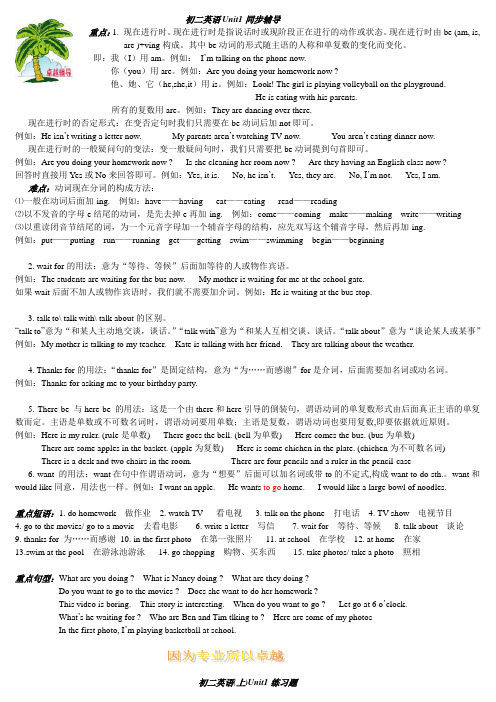
初二英语Unit1同步辅导重点:1. 现在进行时。
现在进行时是指说话时或现阶段正在进行的动作或状态。
现在进行时由be (am, is, are )+ving构成。
其中be动词的形式随主语的人称和单复数的变化而变化。
即:我(I)用am。
例如:I’m talking on the phone now.你(you)用are。
例如:Are you doing your homework now ?他、她、它(he,she,it)用is。
例如:Look! The girl is playing volleyball on the playground.He is eating with his parents.所有的复数用are。
例如:They are dancing over there.现在进行时的否定形式:在变否定句时我们只需要在be动词后加not即可。
例如:He isn’t writing a letter now. My parents aren’t watching TV now. You aren’t eating dinner now.现在进行时的一般疑问句的变法:变一般疑问句时,我们只需要把be动词提到句首即可。
例如:Are you doing your homework now ? Is she cleaning her room now ? Are they having an English class now ?回答时直接用Yes或No来回答即可。
例如:Yes, it is. No, he isn’t. Yes, they are. No, I’m not. Yes, I am.难点:动词现在分词的构成方法:⑴一般在动词后面加-ing. 例如:have——having eat——eating read——reading⑵以不发音的字母e结尾的动词,是先去掉e再加-ing. 例如:come——coming make——making write——writing⑶以重读闭音节结尾的词,为一个元音字母加一个辅音字母的结构,应先双写这个辅音字母,然后再加-ing.例如:put——putting run——running get——getting swim——swimming begin——beginning2. wait for的用法:意为“等待、等候”后面加等待的人或物作宾语。
8年级上册英语同步解析

8年级上册英语同步解析一、单词部分。
1. 重点单词讲解。
- Unit 1 Where did you go on vacation?- anyone:不定代词,意为“任何人”,常用于否定句和疑问句中。
例如:Did you meet anyone interesting on your vacation?(你在假期遇到有趣的人了吗?)其同义词为anybody。
- something:不定代词,意为“某事;某物”,常用于肯定句中。
当用于疑问句时,表示希望得到对方肯定的答复。
例如:I have something to tell you.(我有事情要告诉你。
)There is something wrong with my bike.(我的自行车出毛病了。
)- Unit 2 How often do you exercise?- full:形容词,意为“忙的;满的;充满的”。
be full of = be filled with,例如:The glass is full of water.(玻璃杯里装满了水。
)其反义词为empty。
- maybe:副词,意为“大概;或许;可能”,通常放在句首。
例如:Maybe he is at home.(也许他在家。
)注意与may be的区别,may be是“情态动词+be动词”结构,在句中作谓语。
例如:He may be at home.(他可能在家。
)2. 单词记忆方法。
- 利用词根词缀记忆。
例如,在“unhealthy”这个单词中,“un -”是一个否定前缀,表示“不”,“healthy”是“健康的”,所以“unhealthy”就是“不健康的”。
- 制作单词卡片,一面写单词,一面写释义和例句。
每天复习一定数量的单词卡片,加强记忆。
- 通过阅读英语文章来记忆单词。
在文章的语境中理解单词的用法,这样记忆会更加深刻。
二、语法部分。
1. 一般过去时(Unit 1)- 一般过去时表示过去某个时间发生的动作或存在的状态。
人教版八年级上册英语同步精讲

人教版八年级上册英语同步精讲一、引言人教版八年级上册英语教材是初中阶段英语学习的重要组成部分,对于提高学生的英语综合运用能力具有至关重要的作用。
本文将对该教材进行同步精讲,帮助学生更好地理解和掌握所学内容。
二、教材概述人教版八年级上册英语教材共包含12个单元,每个单元围绕一个主题展开,涵盖了听、说、读、写等各个方面的技能训练。
教材内容丰富,注重培养学生的跨文化交际意识和自主学习能力。
三、重点知识点精讲词汇和短语本册教材涉及大量与日常生活和学习相关的词汇和短语,如表示情感、描述人物特征、谈论学校生活等。
学生应重点掌握这些词汇和短语的拼写、发音及用法,并通过例句和语境加深对它们的理解。
语法知识本册教材的语法知识主要包括时态、语态、非谓语动词、定语从句等。
学生应熟练掌握这些语法规则,并能够在实际运用中准确运用。
例如,在学习过去进行时这一时态时,学生应理解其构成和用法,并能够通过练习加以巩固。
阅读理解阅读理解是英语学习中的重要环节,本册教材通过提供多篇与主题相关的阅读材料,帮助学生提高阅读速度和理解能力。
在阅读过程中,学生应学会运用预测、略读、扫读等阅读策略,快速获取文章大意和关键信息。
同时,还应注意培养分析、归纳和总结的能力,以便更好地理解文章内容。
听力训练听力是语言交际能力的重要组成部分。
本册教材通过提供丰富的听力材料,帮助学生提高听力水平。
在听力训练中,学生应学会预测听力内容、捕捉关键信息、理解听力材料的深层含义等技巧。
同时,还应注重培养自己的语音、语调和语速等方面的能力,以便更好地进行口语交流。
口语表达口语表达是英语学习的另一重要环节。
本册教材通过提供多种口语活动,如角色扮演、小组讨论等,帮助学生提高口语表达能力。
在口语表达中,学生应学会运用所学知识进行实际交流,注意语音、语调和语速的准确性,并培养自己的交际能力和合作精神。
写作训练写作是英语综合运用能力的重要体现。
本册教材通过提供多种写作任务和范文示例,帮助学生提高写作水平。
初中二年级人教新目标12英语八年级上同步辅导

一. 教学内容:初二Unit 12 What’s the best radio station?重点语法:在各事物间进行比较用形容词的原形、比较级和最高级例句:A: Hello! I'm a reporter.(你好,我是记者。
)Can I ask you some questions?(我能问你一些问题吗?) B: Sure.(当然可以。
)A: What's the best clothing store in town?(城里最好的服装店是哪一家?)B: I think Jason's is the best.(我认为杰森服装店是最好的。
)A: Why do you think so?(为什么这样认为呢?)B: Jason's has the best quality clothes.(杰森服装店有质量最好的服装。
)重点短语:close to = near 靠近;接近inexpensive = cheap 便宜的clothing store 服装店radio station 广播站talent show 业余歌手演唱会it is adj. [for sb.] to do sth. 做某事(对某人来说)感觉……(加形容词)cut the price 打折not ... at all = not ... in the slightest 一点也不in fact 实际上pay for 为……而付款sth. cost sb. (money) 某人花钱买了某物good/well → better → the best 形容词good /副词well 的原级、比较级和最高级bad/badly → worse → the worst 形容词bad /副词badly 的原级、比较级和最高级二. 语言目标:Discuss preferences; Make comparisions三. 目标语言:—What’s the best movie theater?—Gold Theater has the most comfortable seats.四. 重点词、词组诠释:1. radio: ①The shop sells kinds of ___________(radio).②My hobby is to ___________ ___________ the radio. (听收音机)③It’s the best ___________ ___________. (电台)④I study English ___________ radio. (通过收音机)2. comfortable: adj.①The car is ___________(comfortable)than that one.②Which theater has ___________(comfortable)seats in town?③Look! He is sitting ___________in the chair.3. seat: n. sit: vi.①Please take your ___________here. =Please ___________here.②This theater has the most comfortable ___________.4. screen: n.Please ___________(看)the screen. It has a picture on it.5. close:①vt. 关闭。
八年级英语上册1-3单元知识点同步辅导
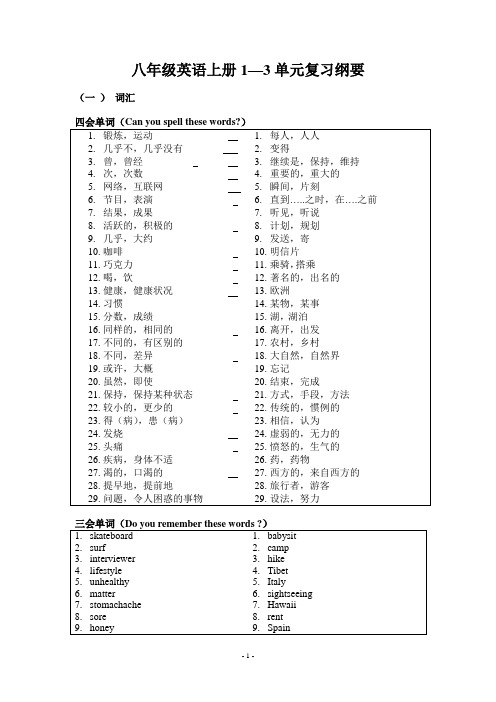
八年级英语上册1—3单元复习纲要(一)词汇1.how often多久一次2.hardly ever 几乎不3.as for 至于,关于4.go to the movies 去看电影5.every day 每天6.twice a month一月两次_7.surf the Internet 上网8.the result of…的结果9.read English books 读英语书10.junk food 垃圾食物11.how many 多少12.of course 当然13.look after 照顾,照看14.want sb. to do sth. 想要某人做某事15.be good for 对……有益16.try to do sth. 尽力做某事17.a lot of 大量,许多18.keep in good health 保持健康19.watch TV 看电视20.have a slight /little / bad / heavy cold 感冒,受凉21.(be/get ) stressed out 有压力的,紧张的22.at the moment 此时,现在23.how long 多久,多长时间24.get back 回来25.take a vacation /take vacations去度假26.a lot 很,非常27.the same as….与…相同28.be different from….与….不同29.have a sore back 背疼30.have a stomachache 胃疼31.lie down and rest 躺下休息32.see a dentist / go to the dentist‟s看牙医33.drink lots of / some water 多喝水/喝一些水34.feel well感觉好35.go to bed early36.listen to music 听音乐37.traditional Chinese doctor 传统中医38.too much 太多39.get tired 感到疲倦40.stay healthy 保持健康41.host family 房东42.take with sb.某人随身携带43.this time 这次44.go camping/ hiking/sightseeing/fishing/shopping45.go away 离开46.go bike riding 骑自行车观光47.take walks 去散步48.give advice49.mimes an illness50. rent videos to sb. 租碟片给某人rent videos from sb. 从某人那租碟片51. make a movie 拍电影52. ask sb about sth 问某人某事53. at night =in the evening 在晚上54..What/How about+ doing …怎么样呢? 1(三)重点句型1. As for homework, most students do homework every day.2. The results for “ watch TV ” are interesting.3. But my mother wants me to drink it.4. It‟s good for my health5. How many hours do you sleep every day?6. And my healthy lifestyle helps me get good grads.7. Good food and exercise help me to study better.8. Is her lifestyle the same as yours or different? What are differences?9. I think I‟ m kind of unhealthy .I hardly ever exercise.10. He shouldn‟t eat any thing11. We need a balance of yin and yang to be healthy .12. It‟s easy to have a healthy lifestyle, and it‟s important to eat a balanced diet .13. It‟s easy for sb. to do sth做某事是容易的。
- 1、下载文档前请自行甄别文档内容的完整性,平台不提供额外的编辑、内容补充、找答案等附加服务。
- 2、"仅部分预览"的文档,不可在线预览部分如存在完整性等问题,可反馈申请退款(可完整预览的文档不适用该条件!)。
- 3、如文档侵犯您的权益,请联系客服反馈,我们会尽快为您处理(人工客服工作时间:9:00-18:30)。
八年级英语(上册)深入教材,提优训练(复习学案)Unit 1.Where did you go on vacation ?一、重点单词(听写)二、重点短语。
(听写)1.相当多,不少2.去度假3.待在家4.照一些照片5.感觉像……;想要6.到达三、重点知识点拨:1、seem 的常用句型。
a.主语+seem(+to be ) +表语。
Tom seems (to be ) a very clever boy.b.It’s seems/ seemed+ that 从句。
It seems that no one knows what has happened in the parkc.主语+seem +动词不定式。
I seem to have caught a cold.2.quite a few 与quite a little二者都表示“相当多,不少”。
quite a few+可数名词quite a little+不可数名词a. There _____ ______ _____ _____ new books in the bookstore.(书店里有相当多的书)b. There _____ ______ _____ ______ water in the bottle.(瓶子里有很多水)3.How do you like…是口语中一个常用句式,意为“你觉得……怎么样?”相当于“What do you think of…”。
注意:How do you like…还可用于下列场合:a.在喝茶或咖啡时,询问对方:“你喜欢喝什么样的茶或咖啡?”。
---How would you like your coffee? ---_____________________.(2012无锡中考)A. Black, pleaseB. Very muchC. It tastes goodD. No, thanksb.用于饭店询问顾客对饭菜的做法。
---How do you like your steak? --- Rare.(嫩一点)c.表示一种厌烦或惊奇的心情,意为“真是的,那你怎么认为\想呢”如:How do you like that?4.I didn’t really see anything I liked.我真的没看到什么喜欢的东西。
本句中I liked 是省略了关系代词that的定语从句,anything是先行词,关系代词只能用that, that 在从句中作动词liked的宾语,可以省略。
宾语从句中关系代词只能用that 的情况:a.当先行词是anything, everything, nothing, few, all, some, no, little, some等时,或者是由every, any, all ,some, no, little, few, much, each等修饰时。
Have you taken down everything that Mr. Li has said?All that can be done has been done.b.当先行词被序数词修饰时。
The first place they visited in London was the Big Ben.c.当先行词被形容词最高级修饰时。
This is the best film that I have seen.d.当先行词既有人,也有动物或者物体时。
Can you remember the scientist and his theory that we have learned?The Palace Museum is the best place ______ I’ve ever visited.(2012年柳州中考)A. whoB. whenC. thatZhang Lili is considered as the most beautiful teacher _______ gave her love to her students in danger.(2012年扬州中考)A. whoB. thatC. whomD. which5.too many, too much, much too的区别。
6.because 与because of 用法的区别。
7.tell sb to do sth. 与tell sb not to do sth.与tell 相关的固定搭配:tell a joke, tell a story, tell lies.8. no与none 区别:a.no是形容词,只作定语,表示“没有”,修饰可数名词或不可数名词。
They have no time to play.b.none 只能单独使用,可做主语、宾语和表语,意思是“没有一个(人或事物)”None of them\is in the classroom.I have many books, but none is interesting.9.other, another, others与the othersa.other意思是“别的”,其前多用定冠词the,多指两者中的“另外那个”或多者中的“另外那些”,表示特指。
You left hand is dirty, show me the other.b.another意思是“另一个;又一个”,一般用来修饰或代替可数名词单数,其前不加其它定语。
I have two cakes, but I want another.c.others 表示不确定的“另一部分”(并非全部),多指三者或三者以上,表示的是不定数目。
There are many people in the park. Some are walking, some are looking at the flowers, others are boating.d. the others表示“其余的全部”。
Here are five pens, One is for Mary and the others are for Jim.10.every 与eacha. every 是形容词,只能做定语修饰单数名词,意思是“每一个”,表示整体概念。
Every one of the students in his class studies very hard.b.each是形容词、代词,可用作主语、宾语、定语等,意思是“每个,各个”表示单个概念;each可放在名词前或后接of短语。
Each of the students has something to do.单元跟踪学习评价I、根据首字母提示填词。
1.Do you want to go to a_______ exciting on vacation?2.--- Would you like s_______ to drink?--- Some tea, please.3.E______had a good time last night.4. S______ left a note to you, David.5.The dish t______ very good. I want some more.6.There ate lots of b______ in big cities.7.I w______ who will meet us.8.There are many d_________ between England and America.9.I am very h_______ .Could you give me something to eat?10.You must t____ your best to pass the P.E. exam.II、单项选择。
1.I like soft and gentle music. It ______ nice.A. tastesB. looksC. soundsD. feels2.The English-Chinese dictionary ______ my father bought for me many years ago is still of great value.A. whoseB. whenC. whoD. that3.---What about ______ a rest? --- OK. Let’s go out and have a walk.A. to takeB. takesC. takingD. take4.My mother bought a new bag ______ me as a birthday gift.A. forB. withC. toD. from5.The best way _____ is to listen to music.A. relaxB. to relaxC. relaxedD. relaxing6.There are ______ oranges at home. Could you please buy some from the supermarket?A. fewB. a fewC. littleD. a little7.Tell the children _______ unhealthy food. It’s bad for their health.A. not to eatB. not eatingC. to eatD. eating8.______ delicious food my mother cooks every day!A. What aB. WhatC. How9.---Do you know ______ the girl in white is?---I’m not sure. Maybe she is a doctor.A. howB. whereC. what10.He can’t hear you because there is _____ noise here.A. very muchB. too muchC. much tooD. so manyIII.用所给词的适当形式填空。
1.I feel like ______ (swim) in the river.2.My father enjoys ______(listen) to the radio.3.We often have some outdoor ________(activity) after class.4.I decide ______( go) to Hang Zhou for vacation this summer.5.He isn’t old enough ______ (go) to school.6.The film is ______( wonder), and I like it very much.7. I enjoyed _______(my) in the party last night.8.Tom seems _____ (be) sad today.9. I often feel ______(bore) in Chinese classes.10.The soup tastes very _____(well).。
